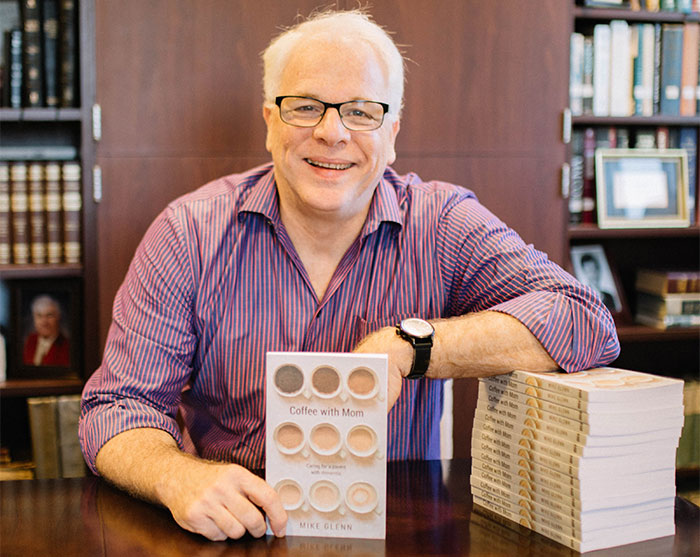 [1]
[1]BRENTWOOD, Tenn. (BP) — As a minister for more than 40 years, Mike Glenn walked through the valley of dementia and Alzheimer’s disease with many families through the years.
 But he admits that until you face it personally it is truly hard to understand what a family goes through.
But he admits that until you face it personally it is truly hard to understand what a family goes through.
“Caring for someone with dementia or Alzheimer’s disease is totally consuming,” said Glenn, pastor of Brentwood Baptist Church, Brentwood, Tenn.
According to the Alzheimer’s Association, an estimated 5.8 million Americans are living with Alzheimer’s, and more than 16 million Americans provide unpaid care for people with Alzheimer’s or other dementias.
Glenn recently penned a book, published by B&H Publishing, entitled “Coffee with Mom: Caring for a Parent with Dementia.” His hope is that the book will provide encouragement to families who are walking down a similar path and help them realize they’re not alone.
“Sometimes, the only thing you want to know is that you’re not alone in the world,” he said. “I hope by telling my mom’s story, you’ll understand there are lots of people who are walking the same road.”
He noted that every patient is different. “There is no ‘right way’ to deal with the disease,” Glenn said.
The book is based on a series of tweets Glenn posted following this daily meeting with his mother, Barbara Glenn, over coffee. He would stop on his way to church each morning and have coffee with his mother at the retirement and memory care center where she lived.
“Sometimes those visits were funny. Other times they were painful beyond belief,” he noted.
The tweets, he said, were a way “to deal with the funny but painful daily process of dealing with Mom and her illness. The tweets found a life of their own and the book followed from there,” he said.
The book was released nearly a year after his mother passed away in July of 2018.
Glenn said having coffee with his mother was “hilarious, humiliating, warm, freezing cold, angry, touching, loving, and brutal” but a year after her death, “I would give anything to have another cup of coffee with her this morning.”
One of the things he learned from his experience was the importance of having conversations about the subject before it becomes an issue.
“I had the gift of my dad telling me how he wanted things done,” should he die before his wife, Glenn said.
Glenn noted that in dealing with patients with dementia, rapid-fire decisions have to be made. “I had the peace of knowing I was doing what dad wanted,” he said. Glenn encourages older adults to tell children what they want while they are able to make those decisions.
“Tell your children what you want done (for specific situations),” he said. “If they know what mom or dad wanted, it will give them peace in difficult situations.”
In the book, Glenn acknowledged, “One of the hardest things about dealing with a parent who has Alzheimer’s is there’s never a clear-cut answer on what to do next. Even if you know ‘what’ to do, knowing ‘when’ to do it is just as baffling. As a care-giver, you’re constantly dealing with ‘on one hand’ and ‘then, on the other hand.'”
Glenn experienced this when he knew he had to take away his mother’s car keys and that she could no longer drive. That was going to be “a suicide mission,” he wrote in the book.
After it was over and his mother was no longer on the highway, Glenn reflected, “It might have been hard. It might have been uncomfortable, but everyone was safe, and I could live with that. Sometimes life gives you hard choices, and other times life doesn’t give you any choice at all.
“Either way,” he noted, “you still have to choose and carry the consequences of that choice for good or bad.”
Glenn observed the greatest lesson he learned while dealing with his mom was the power of love.
“When I was little, I counted on mom to take care of me,” he said. “There was no meeting, no clarification of expectations. I just knew that whatever decision she made would be in my best interest.
“Now, she couldn’t make her own decisions, and she was now counting on me to do what was best for her,” he said. “This is what love does. Love always seeks the best of the beloved. Even when it’s hard — especially when it’s hard. Love makes the hard choices.”
In his book, Glenn reminds readers that when caring for a parent with Alzheimer’s or dementia that “in the end, you have to live with yourself. If you can remember, in all of the craziness of the disease, the only thing that really matters is knowing you did the best you could, you’ll be fine. Less than that is hard to live with.”
Glenn said his desire for the book is that everyone who reads it “would understand the great privilege it is to care for your parents. I was very honored to be able to care for my mom.
“I hope the book will spark some conversations in the family to start talking about the hard choices that life may require of each of us,” he said. “I would want people to understand God is good and God is faithful — even in the toughest of times.”
Glenn’s book is available here [3].

